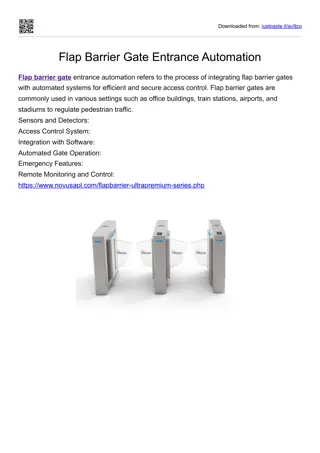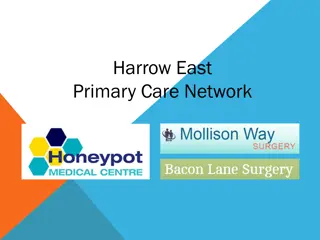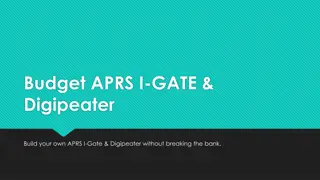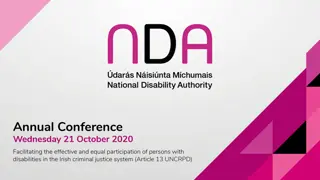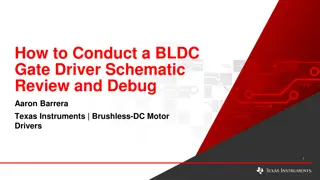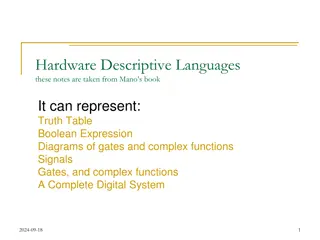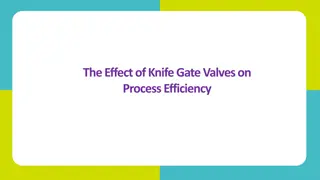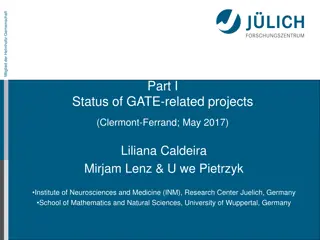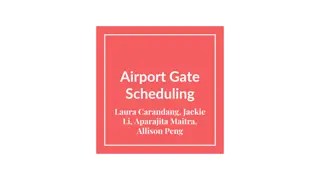Support for Special Educational Needs at Harrow Gate Primary Academy
Harrow Gate Primary Academy provides inclusive support for children with special educational needs through a graduated approach, involving collaboration between teachers, SENCO, and parents. Individualized provision plans are created based on assessments from various sources. Regular review meetings ensure progress monitoring and adjustments to support strategies. The school offers a balanced curriculum with differentiated tasks, group work, and one-on-one support to meet diverse needs. Parents are encouraged to be actively involved in their child's education and support journey.
Download Presentation

Please find below an Image/Link to download the presentation.
The content on the website is provided AS IS for your information and personal use only. It may not be sold, licensed, or shared on other websites without obtaining consent from the author.If you encounter any issues during the download, it is possible that the publisher has removed the file from their server.
You are allowed to download the files provided on this website for personal or commercial use, subject to the condition that they are used lawfully. All files are the property of their respective owners.
The content on the website is provided AS IS for your information and personal use only. It may not be sold, licensed, or shared on other websites without obtaining consent from the author.
E N D
Presentation Transcript
Harrow Gate Primary Academy SEND Support offer
Key Contacts The SENCO is Gemma Holloway. The Education Welfare Officer is Karen Gibbon. The Positive Mental Health Officer (PMHO) is Ema Jackson. All can be contacted at school on 01642 673984. Caroline Fell Tel: 01642 527158 email: SENDIAS@Stockton.gov.uk SEND Information, Advice and Support worker http://stocktoninformationdirectory.org/kb5/stockton/directory/localoffer.page Local Authority Offer 2 9/7/2024
On a termly basis the class teacher and SENCO spend time planning provision for each individual child on the SEND register using the graduated approach process assess, plan, do, review. They base the plan on current assessment data, advice from outside agencies, information shared by parents, pupil views and the teachers professional knowledge of the child. This provision is documented on individual children s Graduated Approach Documents. Each child is set desirable outcomes which aim to help your child to make progress in the areas they have difficulties. At Harrow Gate Primary Academy we pride ourselves on being an inclusive school and strive to meet the needs of all children. Our aim is to identify at the earliest possible time children's special educational needs and to meet these needs in the best possible way. If we believe that your child has a special educational need we will inform you at the earliest possible opportunity. The class teacher will work in partnership with parents and the SENCO to assess the needs of your child. If you are concerned about your child you can speak to the class teacher in the first instance and they can liaise with the SENCO for further support. Assess Plan More information More information More information Review Every term you will be invited to a review meeting. You will look at the progress that your child has made and look at ways that school can continue to support your child as well as to offer guidance as to how you can support your child at home to make continued progress. We will look at how effective the support has been and decide what needs to happen next for your child to continue to make good progress. This will feed into the next provision map. The broad and balanced curriculum that we provide is delivered to all children by their class teacher, ensuring that pupils receive a high level of quality teaching. Do Children work within their own class where the teacher and teaching assistants provide additional support in different ways. This may include; accessing differentiated tasks, working in a collaborative group, participating in intervention groups and accessing 1:1 support where appropriate. This will be planned and assessed by the class teacher. More information More information
Assess If you are concerned about your child in school, the first person that you need to speak to is their class teacher. If we believe that your child has a special educational need or disability we will inform you at the earliest possible opportunity. The class teacher will discuss any concerns with you and then will then get a letter confirming this. Your child s need wills be catagorised into one of the four areas of SEND stated in the SEND Code of Practice 2015: Cognition and Learning, Communication and Interaction, Social, Emotional and Mental Health or Sensory and/or Physical Needs. (https://www.gov.uk/government/publications/send-code-of- practice-0-to-25 ) We monitor the progress of all children very carefully. If we think that your child isn t progressing at the correct rate across all areas, we will talk to you about our concerns in conjunction with the SENCO. The SENCO or someone from the Inclusion Team will carry out some early assessments of need through low key 1-1 assessments with the child, observations and discussions with appropriate adults. If the SENCO feels that it is necessary then referrals to outside agencies could be made i.e. to Speech and Language Therapists, Educational Psychologists, Occupational Therapists, CAMHS etc We will ensure that if required, any Access Arrangements for formal assessments/examinations will be made. Further information can be found at http://www.jcq.org.uk/about-us Main Menu Main Menu
Plan Communication and Interaction Communication and Interaction Cognition and Learning Cognition and Learning Social, Emotional and Mental Health Difficulties Social, Emotional and Mental Health Difficulties Sensory and/or Physical Needs Sensory and/or Physical Needs This section is about the additional support our school offers children/young people with SEND. If your child has been identified as having a special need, there is a range of support that we will offer. We have high expectations of all of our children and expect them all to make good progress. Firstly, we ensure that all children receive the highest quality teaching that is targeted to their individual needs. Work will be differentiated in a range of different ways such as to make differentiated tasks, collaborative working and providing support tools to allow for independence. Some children may work in smaller groups or with additional adult support. Intervention activities will be planned where appropriate to address specifically identified needs. Main Menu Main Menu
All learning in Harrow Gate is carefully tailored to the educational needs of all children, but especially our SEND children. SEND needs are highlighted and provision is put in place. High aspirations and a focus on enabling children and young people to be as independent will lead to the best outcomes. We have a Positive Mental Health Officer (PMHO) who works with a range of different children who usually display some social, emotional or mental health difficulties. The PMHO works therapeutically with children on bespoke programmes in the Positive Mental room (POM). In addition she supports children throughout the school day in class. Both the SENCO and PMHO have achieve The Attachment Leads in Schools qualification which means they are both attachment aware and trauma informed. Specific intervention is implement when children are highlighted as having such difficulties. School have an SLA with Speech Therapist who works in school for one day a week. We aim to identify needs and refer to this service at the earliest time, to intervene before speech and language issues begin to directly impact on other academic achievements. We pride ourselves on being an inclusive school and we will always do everything we can to ensure that all children have to opportunity to access all activities and visits that are arranged in school. If there are times when either school or parents are worried about a particular aspect of school life then a discussion would be arranged including the SENCO to look at ways to resolve any possible issues. School follow a systematic process for following Early Help Assessment process. When school feel this would benefit a child then a EHA is set up in conjunction with the EWO, SENCO, class teacher, parents and other professionals involved with the support of the child. Targets are set and reviewed regularly. Do Main Menu Main Menu
We regularly review the progress that your child is making in school through daily in class teacher assessment, progress through a specific intervention, through more formal testing and regular data captures. We see this as a key part of the jigsaw when meeting the needs of your child. It is important that we know if progress is not being made and therefore need to know that we are required to plan different provision to meet the learning needs of your child. Equally we want to celebrate the progress success of your child and then look at ways to continue this progress. We expect all children to make good progress. Termly reviews are in place for you to review, with the class teacher, your child s Graduated Approach Plan and their progress towards meeting the set desirable outcomes. This is your opportunity to share your thought and opinions about your child s progress, the support that is in place, to share new information you have about your child s needs and to discuss the next steps We involve children in our review process and ask for their opinions on how they feel they are making progress. This is done through the Pupil Voice sections of the Graduated Approach plan. If your child is accessing a planned structured intervention then the progress during this intervention is tracker throughout and overall progress is assessed at the end of the intervention period which is usually about a term. Every term you will receive a written report to let you know how your child is working in school. This will include specific information about their special educational need, their individual targets and ways in which you can support your child in meeting these targets. Review Main Menu Main Menu
Communication and Interaction Communication and Interaction Plan Access to small group and/or individualised interventions to develop skills in communication and interaction. These interventions include: Language Link, Colourful Semantic, Time to Talk, specific speech and language recommendations, social stories/ cartoons, emotional literacy intervention. Children s needs are assessed using Language Link in the Early Years. KS1 and KS2 assessment of language completed by the SENCO using The Communication Trust tool, Progression Tool. Recommendations then put in place or referrals made to appropriate services. School have a Speech Therapist working in school one day a week. Children who are referred to the service access therapy through this resource where appropriate. Recommendations are provided for school to input. Children are profiled on the Launchpad for Literacy Profile and then bespoke plans are made to address highlighted needs. ASD friendly strategies are followed. Children may be withdrawn into low stimulus area or have an individual work station within the classroom. Modifications to lunch and/or break times such as activity groups with the support of a teaching assistant Some children with communication and interaction difficulties may require us to apply for funding for the support of an additional adult. Any transitions are planned very carefully to ensure that children are well prepared. Mentoring and/or buddy systems provide additional support around development of appropriate interaction skills. Scaffolding systems can be used to support and develop social understanding i.e. social stories, social cartoons. Visual timetables may be used alongside the language of Now and Next to help support children with the expectations of the day. Access Technology could be used to support learning. Quality first teaching is planned which focuses on pre-teaching of vocabulary, explicit explanations, chunking of information and other language recommendations. Close liaison with outside agencies and parents to best understand the child s needs. Plan Menu Plan Menu
Cognition and Learning Plan Cognition and Learning Quality first teaching with highly effective differentiation: differentiation by task, through group work, by outcome, by resources provided, by targeted teaching. Teachers follow the recommednations in the EEF document Special Educational Needs in Mainstream Schools - https://educationendowmentfoundation.org.uk/tools/guidan ce-reports/special-educational-needs-disabilities/ Following the Graduated Approach process, strategies are planned with the SENCO and class teacher to meet individual children s needs. A range of tools are used to support this planning process. School can complete cognitive assessment to highlight areas of strengths and difficulties CTOPS assessment, DST-J (Dyslexia test), Dyscalculia Assessment within school, use the Building Blocks for Learning Assessment, Working Memory assessments, Dynamo maths assessment. Other assessments may be completed by the Educational Psychologist Planned targeted intervention in either a small group or one-to-one : Alpha Omega Bespoke systematic phonic programmes ATTACK; Numicon intervention; Dynamo Maths Bespoke intervention to address specific needs; There are many practical resources available such as table squares, time/number lines, pictures, photos to support children to be independent learners in their classrooms. Increased access to ICT resources to record work. Plan Menu Plan Menu
Social, Emotional and Mental Health Difficulties Social, Emotional and Mental Health Difficulties Plan If your child is identified as having social, emotional or mental health difficulties, we offer a range of support in school. Our Positive Mental Health Officer, Mrs Jackson, can support children in the classroom, often working in a Key Adult role through building a trusted relationship with the child is key. The SENCO and PMHO are trained in attachment and trauma and specific programmes of support are devised to support individual children. Harrow Gate Primary Academy is a Thrive Approach school. Identified children can access bespoke Thrive therapeutic sessions with the PMHO who is also a Thrive Practitioner. The sessions focus on developing social and emotional skills in order for children to be able to be the best versions of themselves. An Attachment and Trauma intervention can be planned and delivered for individual children based on the theories advised in the Attachment and Trauma Lead training, completed by the SENCO and PMHO. We support parents with referrals to CAMHS where the SENCO feels this is appropriate. Where appropriate referrals can be made to the Bungalow Project therapy service for specific types of therapeutic need. We implement bespoke programmes to support specific needs i.e. Anxiety We may apply for funding for increased access to additional adults in the classroom in order to meet higher level of needs. Additional adult support is implemented where the children requires a more flexible approach to learning with adult support breaks and time in quiet withdrawal spaces to help manage emotions and to do their work. Also to give the child further explicit instruction and preparation for each part of the day. We may refer to the SBC Inclusion Team for advice on how to meet children s needs. Plan Menu Plan Menu
Plan Sensory and/or Physical Needs Sensory and/or Physical Needs We always support the use of physical aids to support access e.g. wheelchairs, walking frame, hearing aids. We have access to a specialist teacher and Learning Support Advisor for the hearing/visual impaired. The SENCO and PMHO are both trained in Level 1 Sensory Attachment Intervention and can devise sensory support for children. Strive SLA in school to assess and plan intervention for children with sensory processing or motor difficulties. Building Blocks for Learning Assessment used by the SENCO to inform difficulties in motor and perception. From this plans are put into place to support and address highlighted difficulties. Any therapy programmes for motor difficulties and sensory processing difficulties which are designed by specialists e.g. Occupational Therapists or Physiotherapists will be incorporated into children s daily timetable. We provide access to alternative resources to support children accessing their learning. Children can access identified necessary intervention such a Write from the Start, bespoke intervention designed by the Occupational Therapists and linked to the Building Blocks for Learning Assesment. Specialist Clinical Sensory Assessments can be applied for when the SENCO feels this is necessary. Plan Menu Plan Menu








